The last quarter of FY23 (FY23 Q4) saw SARTTAC complete a broadly successful year of mostly implementing its workplan, aided largely by in-person delivery. After more than two years of virtual training and technical assistance (TA) because of the pandemic, around 95 percent of SARTTAC’s activities were done in-person in FY23 (May 2022 – April 2023). Following national COVID-19 rules, IMF guidelines for resuming mission travel, and SARTTAC’s own in-person training protocols, the Center completed a total of 117 activities in FY23. Against the original and revised workplans, the execution rate was 71 percent and 96, respectively. Training outperformed TA, with 90 percent of all planned regional and national courses/webinars delivered against the original workplan and nearly all in the revised one.
A revised FY23 workplan was presented at an interim meeting (virtual) of SARTTAC’s Steering Committee (SC) at end-February 2023. The meeting provided SARTTAC an opportunity to update the SC on preparation of the FY24 workplan and budget and a timetable for completing Phase I of SARTTAC’s funding cycle and starting Phase II, which is expected in January 2024. The revised FY23 workplan factored in reduced activities in the original workplan, but also newly added ones, including two in FY23 Q4—a first-time Macroeconomics Module Course for General Inductees at the Reserve Bank of India and a revenue administration TA mission to Bangladesh on developing a customs regime for goods imported through e-commerce. Other added activity in Q4 included a visit to Tamil Nadu (India) in February 2023 by David Cowen, SARTTAC Director, and Celeste Kubasta, Public Financial Management (PFM) Advisor covering India, to discuss progress on implementing a PFM and macro-fiscal framework project following one year of engagement with the Center.

FY23 Interim Steering Committee Meeting (February 28, 2023)
Finally, FY23 Q4 witnessed several significant staff changes in SARTTAC. In early February, Bhaswar Mukhopadhyay completed his three-year term as Deputy Director in SARTTAC and returned to his home department (African) at HQ. In section below, Bhaswar shares his thoughts on his time in SARTTAC and India. Christian Johnson wrapped up a two-year term as the Macroeconomic Advisor in SARTTAC in late April 2023, with his achievements highlighted below. Oleg Churiy, whose background is featured here, joined SARTTAC as the new Monetary and Foreign Exchange (FX) Operations Advisor in late March 2023. (A new Financial Sector Supervision and Regulation Advisor (Nitin Jain) and new Deputy Director (Saji Thomas) have joined SARTTAC in May and June 2023, respectively, and will be featured in the next quarterly bulletin.)
The interim meeting provided SARTTAC an opportunity to update the Steering Committee (SC) on its activities—recent and planned, Center finances, and preparation for Phase II. Revisions in the FY23 workplan were highlighted—newly added activities as well as postponed ones. SARTTAC noted that the revised workplan built in more diagnostic-related and multi-faceted technical assistance (TA), some aligned with program commitments under IMF-supported lending arrangements. A spotlight was placed on (i) revenue administration (RA), including Tax Administration Diagnostic Assessment Tool (TADAT) missions added for Bhutan, Nepal, and Sri Lanka, with SARTTAC’s participation and funding playing an important role in each, as highlighted in the FY23 Q3 bulletin; and (ii) public financial management (PFM), with a large TA mission in March 2023 looking at Sri Lanka’s fiscal responsibility framework. The SC was apprised that most delays in moving planned CD forward were due to one-off factors, specifically a lengthy hiring process for new monetary operations and financial sector supervision advisors in SARTTAC and work reprioritization by member countries, as they reassessed their post-pandemic CD needs.
A highlight of the meeting was India’s announcement to the SC of a commitment of US$50 million to Phase II of SARTTAC. Earlier acknowledgement of this support by its Ministry of Finance (MoF) has helped frame the parameters for Phase II and need for additional support by other member countries (MCs) and development partners as part of ongoing fundraising efforts. In reconfirming this pledge, Mr. K. Manicka Raj, Joint Secretary in the MOF’s Department of Economic Affairs, who represented the Ministry at the SC meeting, noted the importance of SARTTAC’s efforts in strengthening the institutional and human capacity of its MCs in Phase I. He encouraged the Center to consider engaging with more Indian states and deepen its CD work to meet demand at sub-national level in India. Mr. Raj also commended SARTTAC for including several new areas of training in a preview of the FY 24 workplan, especially noting planned courses on digital economy and climate change issues.

Regional Training on the Macroeconomics of Climate Change (April 24 – May 5, 2023)
Other SC members and representatives also offered guidance on CD needs, including for FY24 and in Phase II of SARTTAC’s operations. Mr. Ramanathan Subramanian, Executive Director, Reserve Bank of India and SC member, proposed more SARTTAC support for work on fiscal risk and debt management issues in the Indian states. Mr. Franck Viault, Minister-Counsellor and Head of Cooperation, Delegation of EU to India and Bhutan, urged close collaboration on PFM work with his and other delegations in South Asia. Finally, Ms. Nelumani Daulagala, Deputy Governor of the Central Bank of Sri Lanka and a new SC member, indicated a need for more capacity development (CD) support on payments settlement, green finance, and financial inclusion. SARTTAC, on its part, highlighted CD work in transformational areas in FY23—i.e., recent training on digitalization issues in relation to PFM, central bank operations, and digital currencies and upcoming courses on the macroeconomics of climate change and financial development and inclusion —both done for the first time in SARTTAC in April 2023. Strong regional interest seen in these topics is a possible bellwether of Phase II CD priorities.
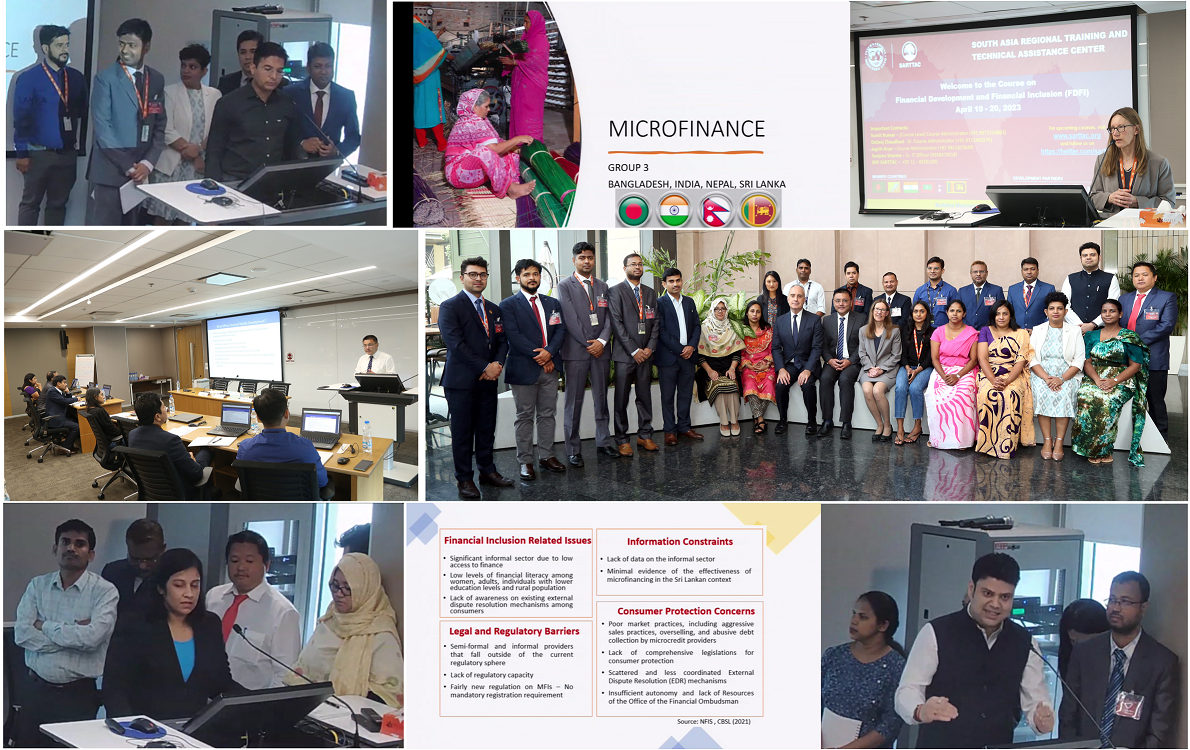
Regional Training on Financial Development and Financial Inclusion (April 10 – 20, 2023)
A seventh annual SC meeting (hybrid) will convene on June 20, 2023 in New Delhi, setting out SARTTAC’s workplan in FY24 and updating on the transition from Phase I to Phase II. At that meeting, SC members will be asked to endorse the FY24 budget and workplan, which will cover both conclusion of Phase I (May – December 2023) and beginning of Phase II (January – April 2024), based on the current financial position in SARTTAC. Member countries and development partners will have a chance to review and discuss the focus of proposed CD programs under Phase II, including possible new or expanded ones. Members and donors will also be asked to indicate their possible pledges to Phase II, which will be essential for the sustenance and growth of SARTTAC. India’s own support provides a solid foundation over the next five years and a mark of confidence in the value of IMF CD in the South Asia region.

Presenting at SARTTAC’s Sixth Annual Steering Committee Meeting (Hybrid) (July 7, 2022)
Mudit: What prompted you to join SARTTAC in February 2020?
Bhaswar: I had worked at the Fund for about 25 years, and in that time, I had done many different jobs. I had worked in area departments, starting off as a junior desk and all the way through to being a mission chief, and also as a resident representative on two occasions, in the Kyrgyz Republic and in Tanzania. I had also spent nearly 11 years in the Strategy, Policy and Review (SPR) department, working in six different divisions—none of which, by the way, exist now—and had many exciting country assignments during this time and led the work on several Fund policy initiatives. In 2019, I had just returned from my assignment as the IMF resident representative in Tanzania, and since AFRITAC East (a regional technical assistance center) is located in Dar es Salaam, I had the opportunity to interact closely with many of the advisors working there, and it was clear they had a very important role to play in building capacity to help development in the region, and so transitioning to a capacity development role was attractive. Of course, the other big attraction of the Deputy Director position at SARTTAC was that it would give me an opportunity to return home to India. For someone for whom the allure of the field was still very strong, this was truly a dream job.
Soon after you arrived the pandemic shut down the world. How did you manage during that time?
Who could have predicted when we arrived, that in a few short weeks, we and everyone else in the country, indeed the world, would be confined to our homes for months, and that work from home would become the norm for about two years and that we would never go back to working totally in-person again! The initial months were very difficult indeed, working under lockdown from a home that was not fully set up and without our ATM cards which we still had not received, and worrying about what the disease entailed and how we and our colleagues could stay safe and still function in our day-to-day lives. I recall that with nearly all our expatriate staff evacuated (including then-Director Sukhwinder Singh), it was left to Pramod Bhardwaj, SARTTAC’s office manager, to stay in touch with our local staff to make sure they were okay and to discuss with me frequently on how to address any issues that arose.

Virtual Course on Financial Programming and Policies (led by Bhaswar) for the Indian Economic Service (March 15 – 26, 2021)
Then there was the question of what our work would be. We are both a technical assistance and a training center and our work crucially involved face-to-face interaction with member country officials, and for a while we were at a loss as to how we should adapt. Gradually though things began to fall in place and in early August that year we were able to host a very successful virtual macroeconomics training course for Indian government officials in cooperation with India’s Lal Bahadur Shastri National Academy of Administration (LBSNAA) in Mussoorie, an effort that was to pay rich dividends in terms of building a strong partnership that spans several courses a year now. Thereafter, we did not look back and from October that year we moved to a full schedule of courses and by the end of the year we had delivered almost the entire macroeconomics program we had planned to before COVID-19 shut us down.
What aspects of your work at SARTTAC gave you the greatest satisfaction?
SARTTAC, as you know, started work in early 2017, and in the initial years the macroeconomics training was largely confined to the standard Institute for Capacity Development (ICD) curriculum. However, I always had the strong feeling that for a center that caters to just six countries, and where you have a very large member like India which has such diverse needs, and indeed one which makes such an important financial commitment to SARTTAC, we should customize our training much more. I also came to understand that the best vehicle for delivering such customized training is through training cohorts identified by recipient agencies in our members. On the macro-fiscal side, we had been doing some such training with Bangladesh and with India we had successfully launched a macroeconomics training program with the Indian Economic Service for their entering and mid-career cohorts.

Phase I Course for Indian Administrative Service Officer Trainees—Macroeconomics Module (organized by Bhaswar) at Lal Bahadur Shastri National Academy of Administration (LBSNAA), Mussoorie, India (April 25 – 29, 2022)
With India, it was clear that we needed to build up a training relationship with LBSNAA, the apex civil service training academy in India, and in the fall of 2021, when the then new director of the academy was seeking to refresh some of their mandated training programs—the Foundation, Phase I and Phase II courses for young civil servants—the experience with the mid-career course which I alluded to earlier helped us get a foot in the door. The macroeconomics modules of these courses have gotten off to a very good start and SARTTAC is well placed to make them even more relevant for young officers in future deliveries. The successful cooperation with LBSNAA has also allowed us to get a foothold with the Reserve Bank of India, and I was happy to be able to plan the first delivery of such a course just before I left.
What are some of your other memories from your time in India that will stay with you?
Where do I even begin to answer that question! The last three years were such a tumultuous time in India (and indeed the world)! To get the least pleasant experience out of the way first, getting COVID-19 and struggling to find a hospital bed during the deadly second wave with the Delta variant was not one I’d like to repeat, but the kindness shown to us by so many people who stepped up to help in ways big and small is something I will always remember. Notwithstanding that experience, I am keenly aware that the deep satisfaction I felt of being back in India after so long—I left India for the USA in 1987—cannot be matched by anything else. The sense of belonging associated with hearing your own language, music, and the sounds of daily life familiar from early childhood are experiences that cannot be replicated anywhere else. I will always treasure the many, many friends I made, first at SARTTAC, and then with the officials we taught, and the faculty and government officials with whom I interacted.
For me, living in Delhi was also special. It was a familiar city, as I had lived there as a child, and then after we moved away, I came back to do my master’s degree at the Delhi School of Economics. So, I had many close friends in the city, and the opportunity to see them again regularly and reconnect with them was wonderful. Of course, being able to be close to family in Kolkata and for our daughters to visit and come to love Delhi, a city they had no connection with previously, was also wonderful. Enjoying the city’s great vibrancy, frequenting the wonderful restaurants, not to mention the street food, the fabulous arts and crafts and shopping in the city, all of these were truly memorable experiences. And finally, we did full justice to the wonderful tourism opportunities in the country—western Rajasthan, the Taj Mahal, Ladakh, Kashmir, Kerala, Amritsar, Lucknow, I would strongly recommend all advisors who come to work at SARTTAC to make time to visit these places.
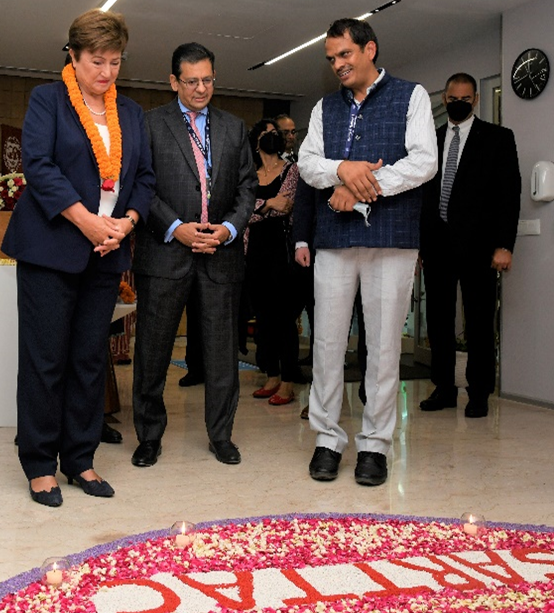
IMF Managing Director’s Visit to SARTTAC (September, 2022)
What will you be doing once you return to IMF HQ in Washington DC?
Since returning to IMF headquarters in February 2023, I have moved forward with plans to retire from the Fund this past April after nearly 29 years. I am keenly aware that to end my career with an assignment in my own country is a rare privilege indeed. My wife and I will continue to maintain a home in the Washington D.C. area, but after a period of settling back in our home and traveling around the USA, which we have not done enough of, we plan to divide our time between Washington D.C. and Kolkata. Of course, we will always think of Delhi as our other home in India and visit frequently. Needless to say, meeting friends at SARTTAC on those visits will be a high priority. I look forward at those times to take pride in seeing SARTTAC go from strength-to-strength.
SARTTAC continued to broaden its engagement in India in FY23 Q4 with two first-ever training courses at the Center—a Macroeconomics Module Course for General Inductees at the Reserve Bank of India (RBI) (February 6 – 10) and Debt Sustainability Analysis (DSA) Workshop for the Export-Import (EXIM) Bank of India (April 5-6).
The macroeconomics module was aimed at helping participants acquire knowledge and skills to gain a general awareness of macroeconomic policies and linkages, and the role of key agencies in macroeconomic management, including central banks like the RBI. Working in close collaboration with Mr. Mugunthan Sadagoban, General Manager of the RBI Academy, and several of his colleagues, the course was designed keeping in mind that the target audience was the general (non-economist) staff of the RBI.
Under the lead of Tubagus Feridhanusetyawan, Senior Economist in the IMF Institute for Capacity Development (ICD), the course used lectures and workshops customized with Indian data, participants assessed the macroeconomic situation in India and identified possible external and internal economic risks and policies to address them. In addition to the IMF faculty, guest lecturers from the RBI shared insights on specific topics (Dr. H.N, Panda, Regional Director of RBI’s Bhubaneshwar Office on behavioral economics; Professor Mazumdar from the Centre for Economic Studies and Planning, Jawaharlal Nehru University on development economics, and Dr. Sangita Misra, Director in RBI’s Monetary Policy Department on the central bank’s monetary policy framework). Ms. N. Mohana, Chief General Manager of RBI’s New Delhi Regional Office, joined the course opening in-person, while Mr. Mugunthan and his colleagues took part in the opening and closing sessions.
Feedback from the participants was generally favorable based on a participants survey conducted by the Center. SARTTAC expects the course will be part of its annual training calendar going forward, with a repeat tentatively scheduled for December 2023. As part of SARTTAC’s efforts to better integrate its work into RBI’s training interests, a short version of the course is planned for mid-career officials in August 2023. SARTTAC and ICD are also planning a foundation course for incoming economists at the RBI for later this year.

Macroeconomics Module Course for Reserve Bank of India officials (February 6 – 10, 2023)
The two-day workshop on DSA, which was led by Christian Johnson, Macroeconomic Advisor in SARTTAC, covered a range of topics geared towards mainly loan and commercial officers from India’s EXIM Bank. In keeping with their work with Indian exporters to developing economies, the workshop focused on the IMF World Bank Low-Income Country Debt Sustainability Framework (LIC-DSF). In addition to familiarizing participants with the basic design and use of the LIC-DSF, the workshop included lectures that provided an overview of Fund lending arrangements and program design, and assessment of a country’s debt-carrying capacity, stress tests, and risk ratings in the LIC-DSF. A brief introduction was also given to the Fund’s new Market Access Countries Sovereign Risk and Debt Sustainability Framework (SRDSF), using the example of Sri Lanka.
At the end of the course, participants had greater clarity on how DSAs were produced, how to interpret them in IMF staff reports, and where to look for more details on the DSF. Officers were also better able to appreciate more nuanced points of DSAs like debt coverage, granularity in risk ratings, and the use of judgement in final ratings of risk of debt distress in individual economies. Course feedback received was positive, with participants noting that the knowledge gained will help them to better appreciate the macroeconomic context of their day-to-day responsibilities.
Debt Sustainability Analysis Workshop for India’s EXIM Bank (April 5 – 6, 2023)

Oleg Churiy joined SARTTAC as the Monetary and Foreign Exchange (FX) Operations Advisor on March 27, 2023. He was previously Deputy Governor of the National Bank of Ukraine (NBU) during May 2015 to July 2020, responsible for implementing monetary policy as well as FX policy and regulation and reserves management, and depository activities, and for developing capital market infrastructure. During his term, the NBU’s key achievements included successful transition of Ukraine to inflation targeting and a floating exchange rate and liberalization of the FX regime, attracting substantial foreign inflows into the government local debt market. He also oversaw the introduction of new financial instruments including currency and interest rate swaps, as well as long-term refinancing. After departing the NBU, Oleg worked as short-term expert for IMF. He also has extensive experience in commercial and investment banking, working in the Ukrainian banking system since 1993, including holding executive positions in a number of commercial and investment banks, supervising treasury, investment banking, and trading activity.
Oleg, who replaced Stefaan Ide in SARTTAC, is working closely under the supervision of the IMF Monetary and Capital Market Department’s Central Bank Operations and Technical Assistance Strategy divisions to provide support to SARTTAC central banks on strengthening monetary policy frameworks and operations, liquidity forecasting and management and FX operations. Since joining SARTTAC, he has been meeting virtually with member country officials and IMF headquarters staff in MCM and the Asia and Pacific Department to better understand capacity development needs, which is of critical importance as SARTTAC finalizes its workplan for FY24 and supports countries in addressing challenges posed by elevated inflation and weak policy transmission mechanisms.
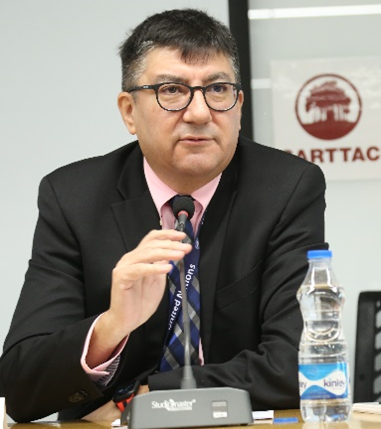
Christian Johnson, SARTTAC’s macroeconomic advisor, finished a two-year assignment at end-April 2023 and returned to the Institute for Capacity Development at IMF headquarters, where he had been a senior economist. Starting in August 2023, he will take up a similar advisor’s position in the IMF Caribbean Regional Technical Assistance Center (CARTAC) in Barbados. During Christian’s tenure in SARTTAC, he taught a range of macroeconomic courses—both for the region and for India, with his final assignments being a first-time debt sustainability analysis workshop for India’s EXIM Bank and a regional macroeconomic diagnostics course using an India case study—both in April 2023.
He also worked on macroeconomic framework TA for ministries of finance in Bhutan and Bangladesh and contributed to other training outside the macroeconomic program, collaborating with other SARTTAC LTXs. His expertise in macro-econometric modelling and nowcasting won him praise with different agencies in the region, including sharing his expertise through informal consultations. Of course, Christian enjoyed Delhi, too, always to be counted on for a good restaurant recommendation. We wish him well in CARTAC and look forward to a new macroeconomic advisor joining SARTTAC in the coming months.
Technical Assistance: February – April 2023
BANGLADESH
Macroeconomics: As part of an ongoing project to assist the Ministry of Finance in building a macroeconomic framework to support their policy decision-making processes, ICD delivered a four-day virtual mission (April 9-12). The mission was helpful in maintaining the momentum built for the project during the January 2023 scoping mission by reinforcing concepts covered earlier and familiarizing the core MOF team with the IMF’s Macro-framework Foundations Tool populated with Bangladesh data.
Revenue Administration: During a mission in 2022, the National Board of Revenue (NBR) had indicated that CD support for building a robust customs regime for goods imported through e-commerce channels was a high priority area. In response to this request, a mission (April 30-May 9) delivered TA to the Customs Wing of NBR. The mission reviewed current customs regulations, data and resource requirements and made recommendations on business processes and regulatory changes needed to achieve the NBR’s goals.
Government Finance Statistics: A mission (March 13-17) assessed progress made on improving the quality of Bangladesh’s government finance statistics (GFS) since the previous one in September 2022. Focus was on producing higher frequency quarterly GFS for the budgetary central government (BCG) and compiling and disseminating annual BCG data by functional categories, in accordance with the Classification of the Functions of Government (COFOG) framework. More details on training delivered during the mission can be found here.
BHUTAN
Real Sector Statistics: A mission (March 13-17) assisted the National Statistics Bureau (NSB) in refining industry classification and to complete the classification of output and intermediate consumption by products in the Supply-Use Tables (SUTs). This process, which resulted in balanced SUTs, will be followed by a later mission working with the NSB on finalization of rebasing and dissemination of the rebased GDP.
INDIA
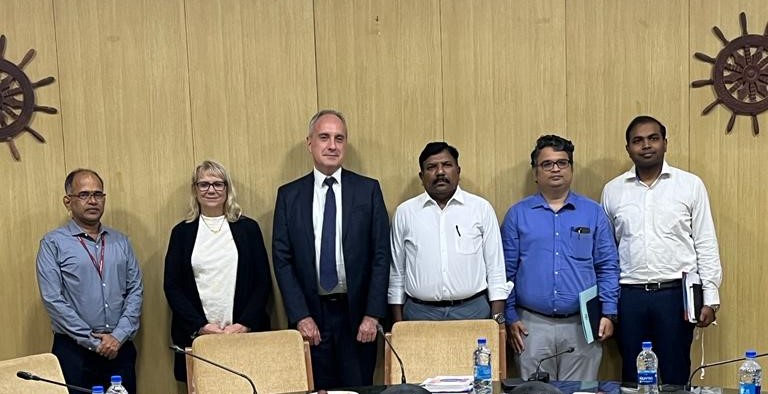
February 2023 visit with Tamil Nadu (India) Finance Department Officials
Public Financial Management: A review of achievements and future CD activities under Tamil Nadu’s public financial management (PFM) reform project with SARTTAC was conducted during a one-day visit (February 6). The visit, which was joined by SARTTAC’s Director, included discussions with the Additional Chief Secretary, Deputy Chief Secretary (Budget), and other senior officials in the Finance Department on strengthening PFM and macro-fiscal frameworks in Tamil Nadu.
During the visit, reforms initiated in the first year of 30-month CD project (from November 2021) with SARTTAC were discussed, encompassing the publication of Fiscal Strategy Paper, improvements in strategic budget processes, preparation and publication of a Fiscal Risk Statement, adoption of a public investment management program (as part of a Public Investment Management Assessment mission in November 2022 led by the IMF Fiscal Affairs Department), and establishment of a strategic public sector undertakings (PSUs) oversight program. New activities to be initiated in FY24 were also discussed, which will cover cash management activities, including support for establishing a cash and debt management unit, training on cash flow forecasting, and creation of a Treasury Single Account. Tamil Nadu will also host a SARTTAC workshop on budget communication and transparency for selected southern and eastern India states in Chennai (June 14-16).
Two missions to Odisha were also delivered during the quarter. The first (April 10-13) reviewed progress made on the implementation of the commitment control system in the state and recommended changes in the system needed to improve the coverage and utility of reports produced by the commitment register software. The second mission (April 17-28) was delivered virtually and focused on cash management reforms and challenges faced in implementing recommendations made in earlier missions.
Real Sector Statistics: A mission (February 20-24) to the National Statistics Office of the Ministry of Statistics and Programme Implementation discussed options for updating the consumer prices index (CPI) in the near to medium term. As the current weights of the CPI were derived from a consumer expenditure survey (CES) conducted in 2011-12, a new CES is in the field. The mission made recommendations on CPI weight updates, classification of expenditure, and data collection.
NEPAL
Revenue Administration: In response to a request from the Inland Revenue Department (IRD), a mission (April 9-20) supported the Large Taxpayers Office of the IRD in its efforts to improve audit outcomes, through implementation of risk-based audit processes, supported by advanced data analytics. The mission included a review of the current audit process and a workshop on advanced data analytics and predictive modelling for audit.
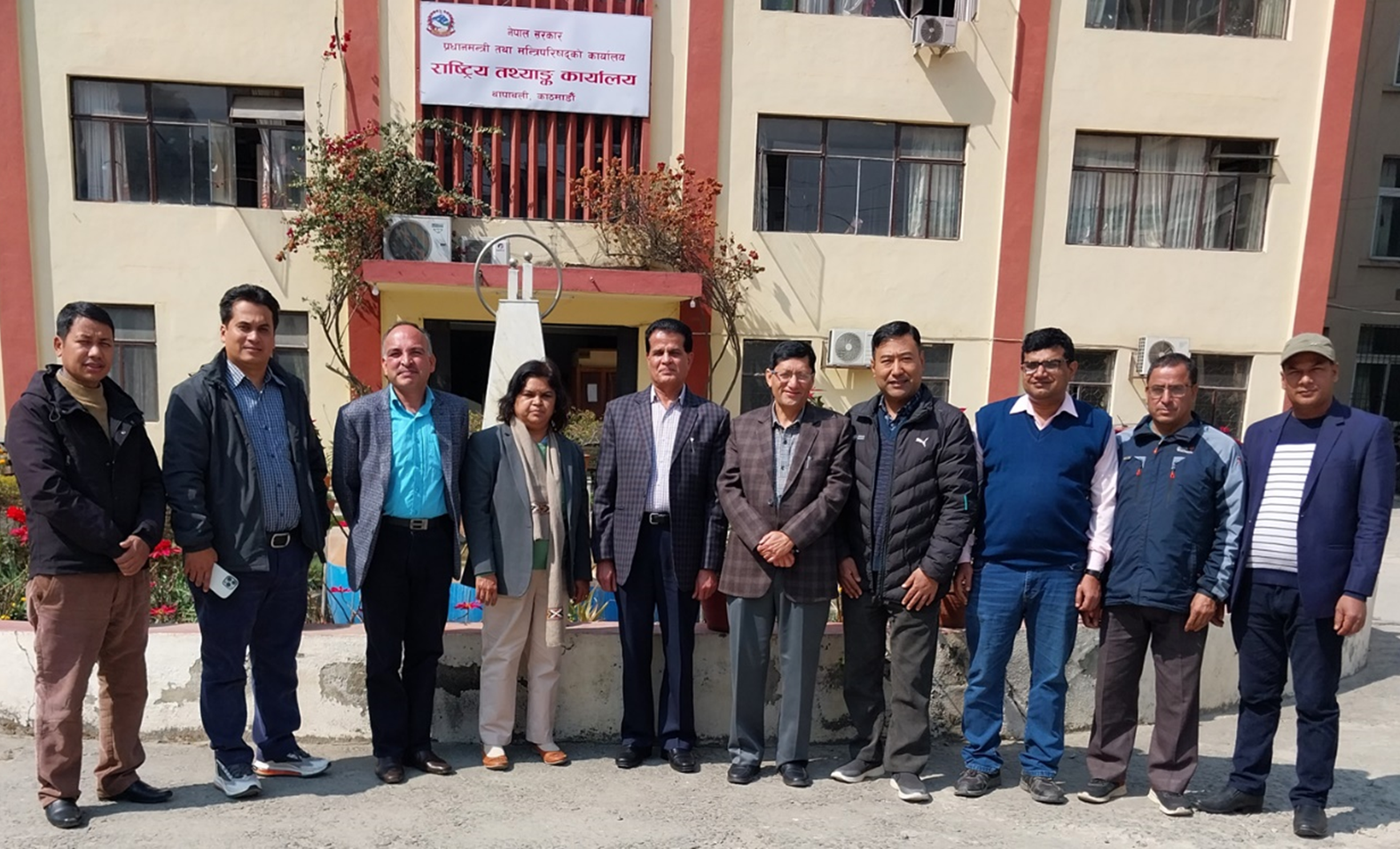
A TA Mission on Quarterly GDP Compilation with Officials from Nepal’s National Statistics (February 2023)
Real Sector Statistics: A mission (February 13-17) reviewed the quarterly GDP compilation methodology used by the National Statistics Office of Nepal. The suitability of the data sources and indicators used to compile the quarterly value added of all activities and annual institutional sector accounts (ISAs) were also examined. The mission also made recommendations on exchanging information with other government agencies and improving methods used to estimate quarterly gross value-added estimates from indicator series.
SRI LANKA
Public Financial Management: At the request of Sri Lanka’s Ministry of Finance, a mission (March 13-24), delivered in collaboration with the IMF’s Legal Department, provided advice on revising the fiscal responsibility framework (including fiscal rules) and followed-up on the progress in drafting a new PFM bill. The team also advised on how to incorporate the new framework into the bill.
IMF Departments: FAD (Fiscal Affairs), MCM (Monetary and Capital Markets), STA (Statistics)
SARTTAC Funding Programs: FSR (Financial Sector Supervision and Regulation). GFS (Government Finance Statistics), MONOPS (Monetary and Foreign Exchange Operations), PFM (Public Financial Management), RA (Revenue Administration), and RSS (Real Sector Statistics)
Access SARTTAC TA Reports on secure website (Requires Login Credentials)
Macroeconomics: A total of three regional courses were delivered. The first course was on Macroeconomic Diagnostics (April 10-21), which aimed at strengthening participants' ability to comprehensively assess a country's macroeconomic situation, including the current state of the economy; the stance of fiscal and monetary policy; financial stability issues and exchange rate misalignments; risks and vulnerabilities of an economy, included those related to debt sustainability; and the medium-term outlook.
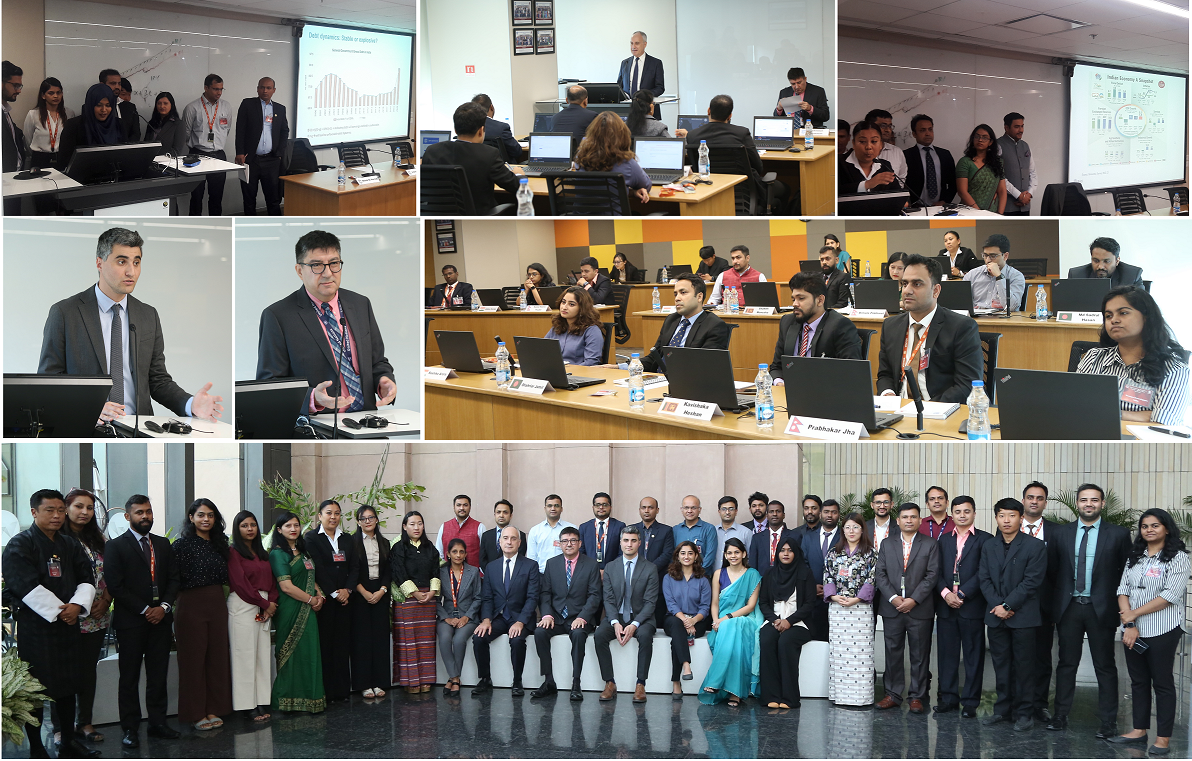
Regional Training on Macroeconomic Diagnostics (April 10 – 21, 2023)
The second course explained the macroeconomic relevance of Financial Development and Financial Inclusion (April 10-20). Beginning with an analysis that defined the role of finance in the economy, the course presented a framework for financial market development, identified the main players and instruments, and highlighted impediments posed, and policies needed in developing financial markets. The third course was on the Macroeconomics of Climate Change (April 24 – May 4), which provided participants with an overview of the science and economic costs of climate change and discussed adaptation and mitigation policy options for tackling climate change. At the end of the course, participants were divided into four groups. Each randomly chose one of the six member countries in SARTTAC on which to prepare a final presentation on the national climate change strategy and challenges, with Bhutan, India, Maldives, and Nepal featured.
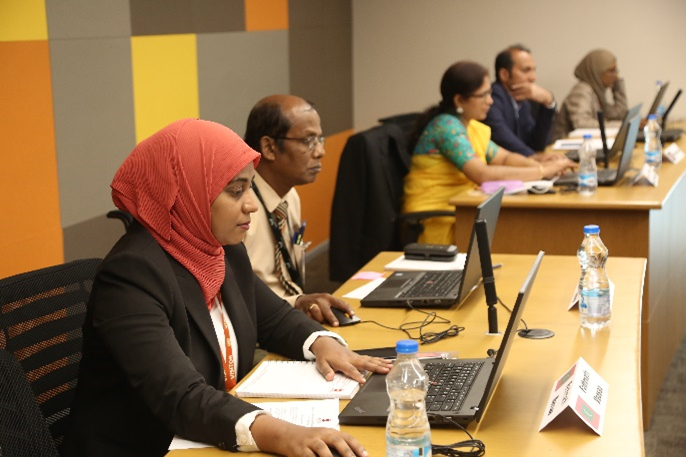
Regional Training on Collections and Arrears Management (February 27 – March 3, 2023)
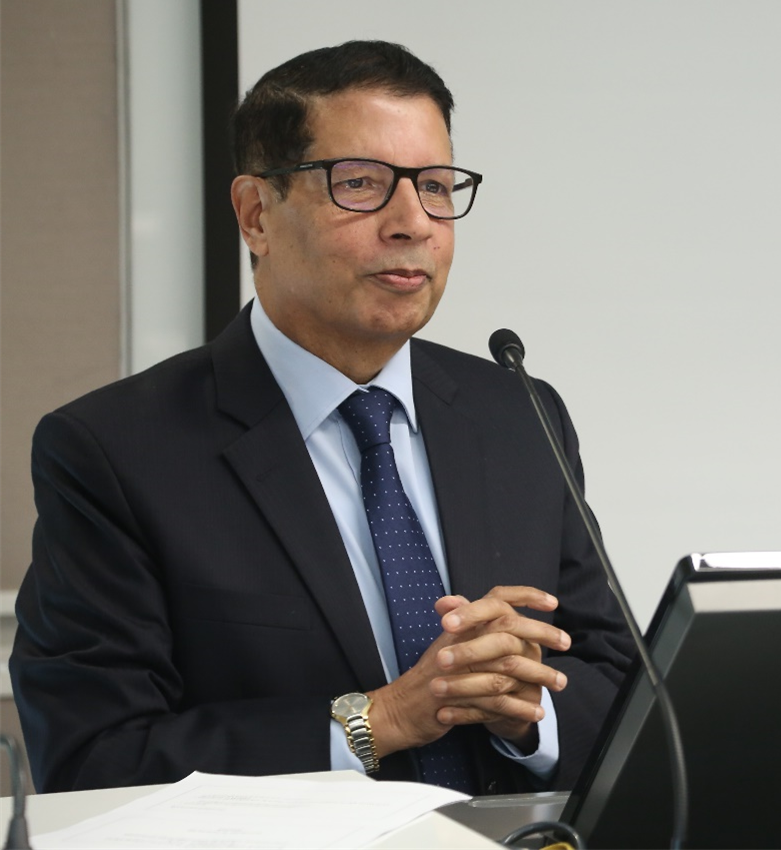
The Honorable Dr. Shankar Prasad Sharma, Nepal’s Ambassador to India, delivering a keynote address to a Regional Workshop on Public Investment Management Assessment (February 13 – 17, 2023)
Revenue Administration: A course on Collections and Arrears Management (February 27-March 3) covered the key fundamentals of efficient and effective payment systems to minimize the occurrence of arrears. It also focused on international best practices in treating tax arrears, including the use of behavioral insights and emerging technologies. Another course on Taxpayer Registration (April 24-28) provided participants with an understanding of both the theoretical
concepts of managing registration risks and the practical application of those concepts. It covered the essential elements of the registration process; legal requirements of registration, including the policies to build a taxpayer register with adequate information; and the use of technology to improve authentication and speed up processes.
Public Financial Management: A regional workshop (February 13-17) on Public Investment Management Assessment provided an opportunity to officials in the region to expand their knowledge of the assessment methodology and enabled them to monitor their progress in public investment management reforms. The workshop also covered the links between public investments and a medium-term budget framework. Nepal’s ambassador to India Dr. Shankar Prasad Sharma delivered a keynote address on the first day on the topic Infrastructure Challenges Facing 21st Century Asia.
Government Finance Statistics: A course (February 6-10) was delivered on Classification of the Functions of Government (COFOG) for Government Finance Statistics (GFS) that helped participants gain an understanding of how the ten functions of government as described in the Government Finance Statistics Manual 2014 are classified, how the categorization of expenditure data to generate a functional split is done, and why this functional classification should reconcile with the economic classification of expenditure data used in the GFS. In addition, applications of COFOG for reporting select UN Sustainable Development Goal indicators were also discussed.
Public Financial Management: A workshop (April 9-13) titled Strengthening Cash Management and Treasury Single Account (TSA) was delivered to nominated officers of Ministry of Finance in Dhaka. This training followed up on an earlier mission on TSA done in June 2022. The workshop covered the conceptual model of TSA, options for banking arrangements, international experience with TSAs, innovations in payment systems, introduction to cash flow forecasting, and determination of the cash buffer.
Government Finance Statistics: A workshop on intermediate GFS (March 19-23), as part of a TA mission, was delivered to officials from the Ministry of Finance and the Office of Controller General of Accounts. It focused on the practical application of the theoretical knowledge gained in introductory training on GFS imparted in September 2022.
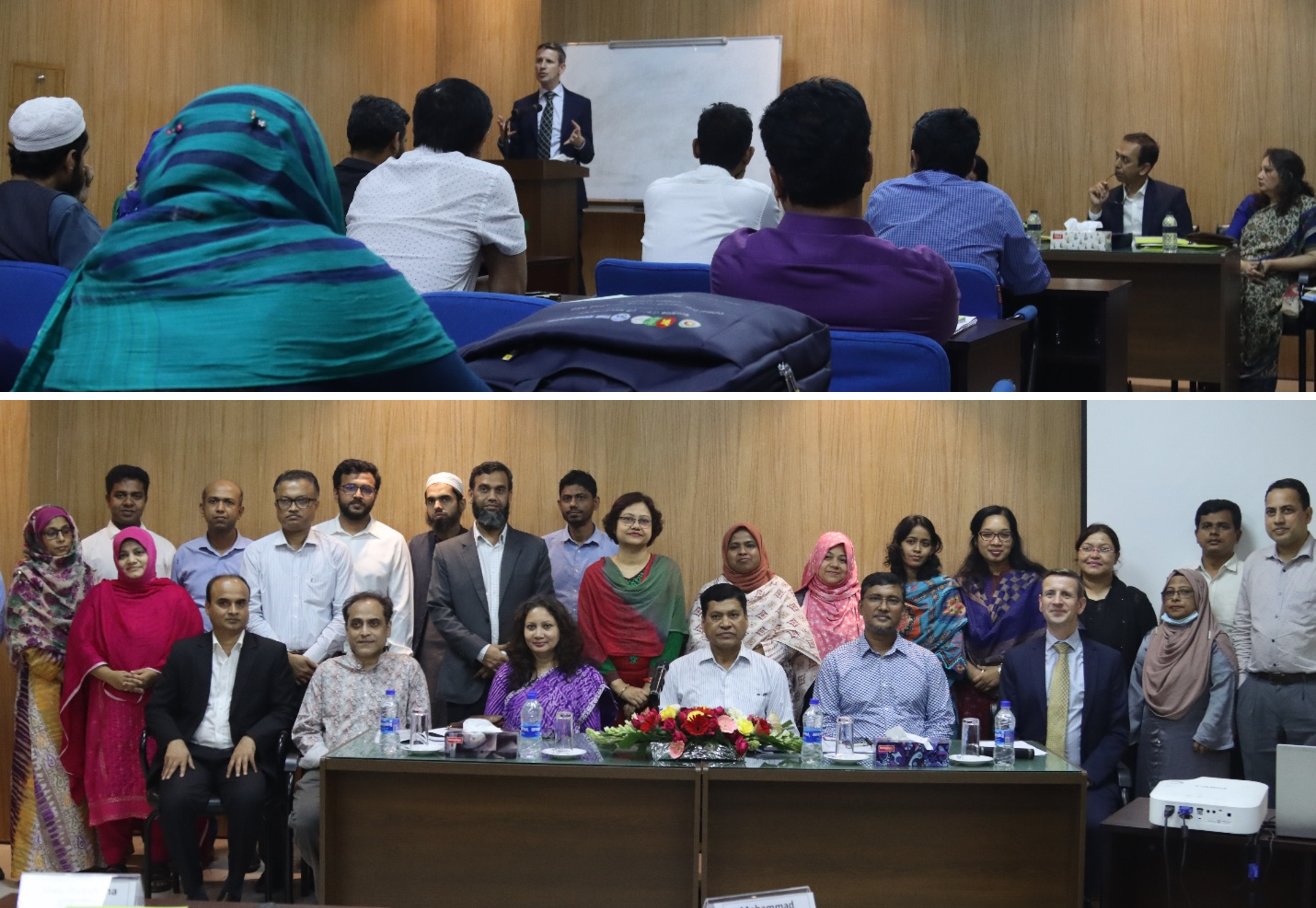
A Workshop on Intermediate GFS delivered as part of a GFS TA Mission to Bangladesh (Dhaka, March 19 – 23, 2023)
BHUTAN
Public Financial Management: A workshop (April 3-7) titled Strengthening Cash Management and the TSA was delivered to officers of the Ministry of Finance’s Department of Treasury Accounts. The training supported the authorities’ program to implement recommendations from an earlier mission in January 2020. Participants were also instructed on the IMF Cash Flow Forecasting Tool and were encouraged to use it to prepare cash flow forecasts.
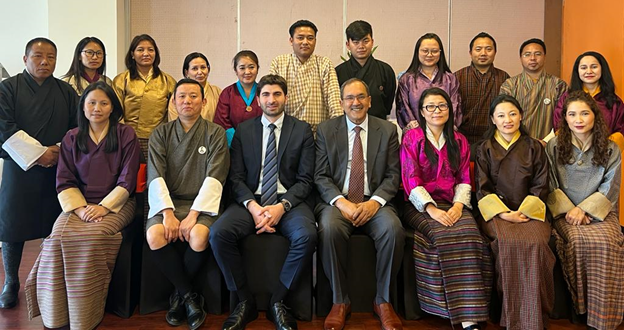
A Workshop on Strengthening Cash Management and the Treasury Single Account for officials from Bhutan’s Department of Treasury Accounts in the Ministry of Finance (Thimphu, April 3 – 7, 2023)
INDIA
Macroeconomics: Three courses and workshops were delivered to different cohorts of officials in India. The first two were a Macroeconomics Module Course for Reserve Bank of India General Inductees (February 6-10) and Debt Sustainability Analysis Workshop for Export Import Bank of India (April 5-6). More details can be accessed here. Lastly, a course on Selected Macroeconomic Issues (April 11-14) was delivered as part of Phase I training for new Indian Administrative Service (IAS) Officers at Lal Bahadur Shastri National Academy of Administration (LBSNAA) in Mussoorie, Uttarakhand. The course was designed to enable participants to interpret economic reports, including IMF staff reports and government economic surveys, and thus facilitate better understanding of the impact of macroeconomic policy making and analysis on localized challenges.
Public Financial Management: A webinar (March 28) presented two Budget Process Tools to Reduce or Redirect Public Spending. They are covered in two IMF How to Notes released in 2022 on “How To Prepare Baseline Budgets” and “How to Design and Institutionalize Spending Reviews”. In addition to discussions on each, the webinar also presented related implementation experiences, covering the experiences of Canada, Poland and select Organization for Economic Co-operation and Development (OECD) countries.
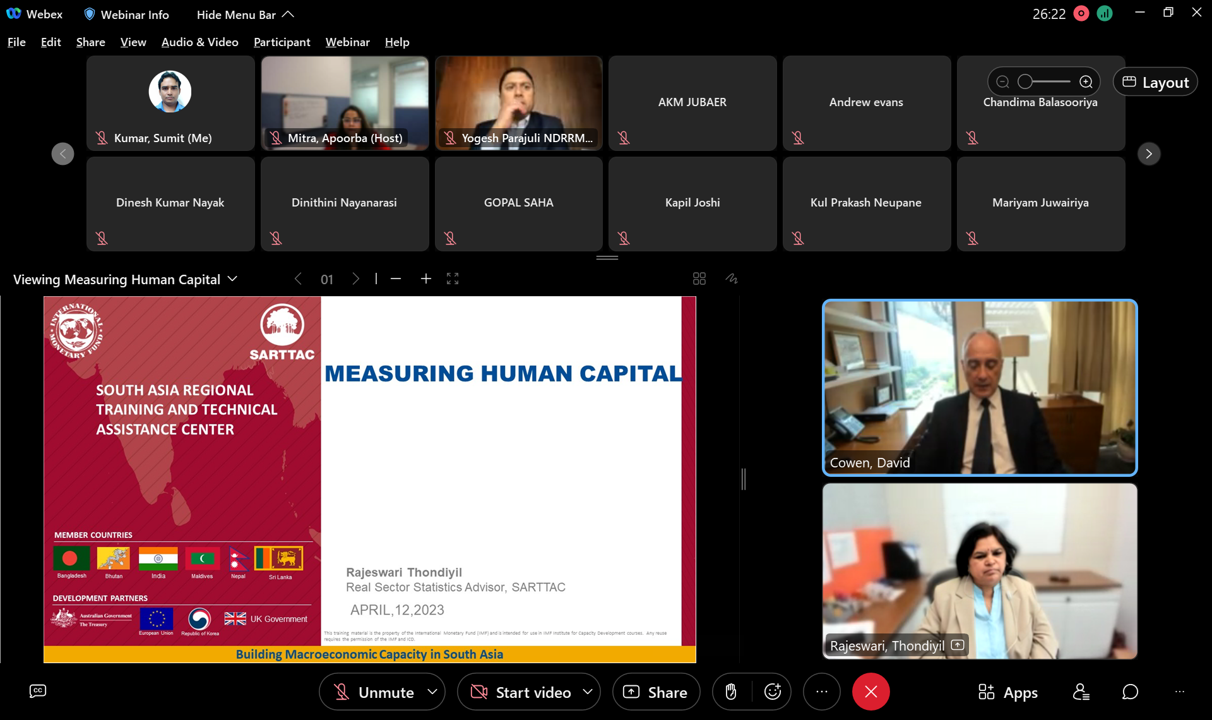
Regional Webinar on Measuring Human Capital (April 12, 2023)
Real Sector Statistics: A webinar on Measuring Human Capital (April 12) was second in the SARTTAC webinar series on System of National Accounts (SNA) update issues. The first webinar in the series was on Valuing Unpaid Household Services and was delivered in June 2022. Drawing on the body of international guidance, the April 2023 webinar provided participants with an understanding of methods for measuring human capital and challenges associated with its measurement. Topics discussed included SNA production boundary and its extension, and household satellite accounts..
